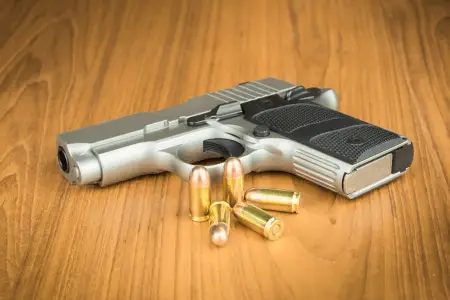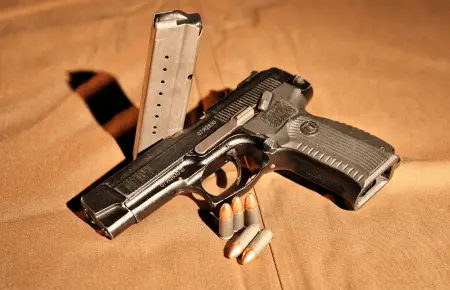It’s not rare for people to get confused between .380 and 9mm ammunition as both have the same diameter. However, these types of ammunition are not interchangeable and they do have distinct features, which this article seeks to explain.
Summary Table
| .380 | 9mm |
| Light-weight, straight case ammunition with an overall length of .984 in (25 mm) | Relatively light-weight, tapered case ammunition with an overall length of 1.169 in (26.69 mm) |
| Usually preferred by civilians for self-defense | Preferred by US law enforcement agencies |
| Also called .380 Auto, 9mm Short, 9mm Corto, 9mm Browning, and 9mm Kurz | Also called 9mm Luger, 9x19mm Parabellum, 9mm NATO, and 9×19 |
Definitions

A .380 ACP (Automatic Colt Pistol) is a straight-walled, rimless pistol ammunition which members of the American police and military usually depend on as ammunition for their backup weapon. This ammunition is primarily used by civilians for self-defense as pistols that use it are easy to conceal and can hold a good amount of rounds.
Although a .380 ACP cartridge is light and compact, it offers a relatively short range and less stopping power compared to other modern handgun cartridges. People who prefer a lightweight or small handgun with manageable recoil usually use .380 ACP.
A bullet’s wounding potential usually depends on its expanded diameter, bullet energy, and penetration depth. A .380 ACP bullet has a bullet energy from an estimated 190 to 220 foot-pounds force or 260 to 300 joules. Penetration depth ranges from 6.5 to 17 inches (16.5 to 43.2 centimeters).
The .380 ACP was the ammunition used in the assassination of Archduke Franz Ferdinand and his spouse Sophia. This was the event which led to World War I.

The 9mm cartridge, also called the 9×19 mm Parabellum, 6 mm NATO, and 9mm Luger, is considered the most popular and widely used ammunition in military handguns and submachineguns. Industry experts credit the 9×19 mm for making semiautomatic handguns overtake revolvers in popularity as many are of the opinion that it is reliable in self-defense and police work. It is widely available and costs less than other ammunition.
The 9mm cartridge was initially designed to posses a stopping power of up to 50 meters; however, it is still effective at longer distances. It has a moderate recoil combined with a flat trajectory.
The term “parabellum” is actually taken from the Latin phrase Si vis pacem, para bellum, which means, “If you seek peace, prepare for war.”
.380 vs 9mm
So what’s the difference between .380 and 9mm ammunition?
A .380mm cartridge is a light-weight, straight-walled, and rimless pistol ammunition developed by American firearms designer John Moses Browning. It was first used in a hammerless, semi-automatic Colt Model 1908. The .380mm has since been widely used in smaller handguns. The 9mm ammunition is considered by experts as “the most popular and widely used cartridge in military handguns and submachine guns.” Designed by Austrian firearms designer Georg Johann Luger, the 9mm cartridge was first used on the Luger semi-automatic pistol.
Video
Here’s a firearms expert talking about how to tell these popular types of ammunition apart.




